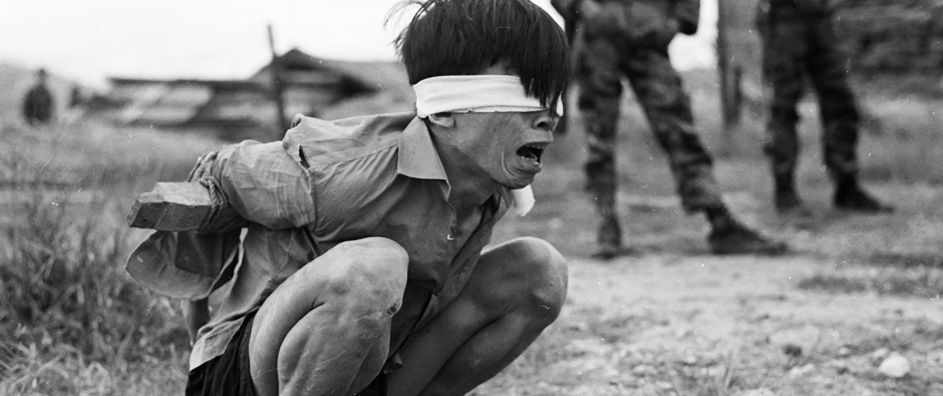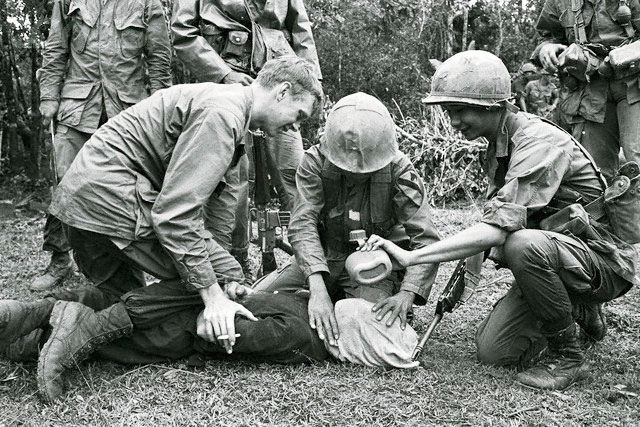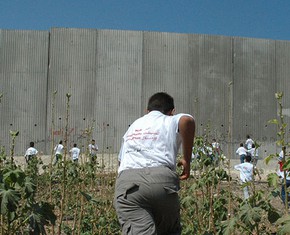The views expressed in our content reflect individual perspectives and do not represent the authoritative views of the Baha'i Faith.
I met an interesting guy during the war in Vietnam—we’ll call him Ralph. I’m hesitant to use his real name, because he’s probably a war criminal.
But I’m getting ahead of myself. Let me tell the story in the proper order.
Ralph and I got acquainted pretty quickly after I arrived in Vietnam. Both of us had the bad luck to draw assignments to the 101st Airborne Division, stationed near the DMZ, the demilitarized zone that separated North from South Vietnam. During that period, the war raged more intensely than it had for a long time. The American part of that war, slowly winding down because of the mounting pressures from the global antiwar movement, had resulted in the departure of the U.S. Marines from the region, which emboldened the North Vietnamese Army and the Viet Cong. As a result, the Army soldiers there faced ferocious battles most days, with the North exerting increasing pressure on the DMZ and the Americans.
Ralph and I worked in the same platoon—although he had enlisted as an infantryman, and I was drafted into the Army as a conscientious objector who didn’t carry a weapon. We often talked about religion, because he considered himself a devout Christian, and I had become a Baha’i about two years before. Ralph was a short, intense, dark-haired Italian guy from Brooklyn who had grown up in a very conservative Catholic environment. He saw the war in Vietnam as a holy cause. “Communism is anti-Christian,” he told me once. “That means I’ll fight to the death for my Christian country.”
That position appalled me. I tried to tell Ralph about the Baha’i teachings and their emphasis on peace, world unity and the oneness of humanity, but those ideas appalled him. As time went by, he got much more into the role of warrior, and we talked less and less. We had never become real friends, but now the gulf between us grew wider. On the few occasions when I did see Ralph, I could tell he was really enjoying the war and his role in it. Friends told me that the war had brought out Ralph’s cruelty, but I didn’t believe it—until I saw it.
We had been in-country for maybe eight months when Ralph came by and got me one day, saying “Hey, Dave, you gotta see this! Come and look!” We walked over to a large helicopter landing zone, and he said “It’s a new deal—Airborne guts.” He pointed to a North Vietnamese prisoner he had tied to a fencepost a hundred yards away.
“Guts” was a torture tactic a few Army soldiers had adopted. It involved tying a Vietnamese prisoner of war to a stake, then marching by in a line, with every soldier hitting, gouging, kicking, stabbing or otherwise injuring the hapless victim. You were “gutless” if you didn’t join in. It also presumably protected the participants from war crimes accusations, since everyone in the platoon took part.
Helicopters buzzed overhead, like they always did in Vietnam, but several turned circles above us. When they’d get into position, they’d strafe the prisoner, the door gunners filling the air with flying machine-gun rounds, a visible stream of death pouring down at the small Vietnamese body strapped to the post. Even though he was obviously already dead, the body would jump and flinch when the bullets hit.
Ralph laughed wildly at the horrified look on my face. I turned and walked back, and I used the walk to try and understand. I had learned that war can dehumanize even the best people; and I knew that Ralph had lost a good buddy, in a particularly gruesome way, during a Vietnamese attack, so I understood his desire for revenge. But no matter how hard I tried, I couldn’t understand how a professed Christian could so blatantly violate Christ’s commands and participate in the torture of another human being.
Later I went to the Baha’i writings, where I often found myself seeking solace and refuge during the war, to try to find some understanding. This is what I found:
Jesus Christ said, “Put up thy sword into the sheath.” The meaning is that warfare is forbidden and abrogated; but consider the Christian wars which took place afterward. Christian hostility and inquisition spared not even the learned; he who proclaimed the revolution of the earth was imprisoned; he who announced the new astronomical system was persecuted as a heretic; scholars and scientists became objects of fanatical hatred, and many were killed and tortured. How do these actions conform with the teachings of Jesus Christ, and what relation do they bear to His own example? For Christ declared, “Love your enemies, … and pray for them which … persecute you; that you may be the children of your Father which is in heaven: for he maketh his sun to rise on the evil and on the good, and sendeth rain on the just and on the unjust.” How can hatred, hostility and persecution be reconciled with Christ and His teachings? – Abdu’l-Baha, The Promulgation of Universal Peace, p. 86.
That passage perfectly posed the question I had asked myself. Then I found one more that answered it:
Reflect upon the instructions of Christ, and investigate the habits and customs of the Popes. Consider: is there any resemblance between the instructions of Christ and the manner of government of the Popes? We do not like to criticize, but the history of the Vatican is very extraordinary. The purport of our argument is this, that the instructions of Christ are one thing, and the manner of the Papal government is quite another; they do not agree. See how many Protestants have been killed by the order of the Popes, how many tyrannies and oppressions have been countenanced, and how many punishments and tortures have been inflicted! Can any of the sweet fragrances of Christ be detected in these actions? No! in the name of God! – Abdu’l-Baha, Some Answered Questions, p. 136.
When people torture one another, I realized, their moral and religious conscience has failed. And when even the leaders of religion justify war, torture and murder, how can we expect their followers to do differently?
I understood then why the Baha’i teachings emphasize the necessity of the renewal of religion.
You May Also Like
Comments


















"And I say to thee: That thou art Peter; and upon this rock I will build my church, and the gates of hell shall not prevail against it. 19 And I will give to thee the keys of the kingdom of heaven. And whatsoever thou shalt bind upon earth, it shall be bound also in ...heaven: and whatsoever thou shalt loose upon earth, it shall be loosed also in heaven."Matthew 16:18-19.
I'm also fairly sure if all religions are one you are just attacking your own faith. The discrepancies you cite are twisted or fabricated for wicked purposes. The church has not and will not change because it can not, it upholds solely God's authority and will alone. It is not merely some laymen elected cabinet of laymen as your "house of justice". It is a divine institution established by God himself to be passed on to his disciples and their successors; who have devoted their entire lives to him. It exists only to teach his word as he taught it, although many do not listen. It is the true church's true authority (God and his sacred scripture) that is infallible not the acts of individual's. Exactly the opposite it is taught, that we all sin, that Jesus died so that all sins MAY (not will but may) be forgiven. It exists only because God wills it to, if an authoritative source was not needed God wouldn't send us his messengers. Perhaps this may help http://youtu.be/ePodNjrVSsk . We are all the same humanity capable of the same highs and lows, how can you claim to be a bahá'í if you don't accept this?
"The church is justified; not because it's members do not sin, but because they do."